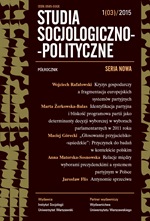Identyfikacja partyjna i bliskość programowa partii jako determinanty decyzji wyborczej w wyborach parlamentarnych w 2011 roku
Party Identification and Ideological Proximity of the Party’s Program as Determinants of Electoral Decision in Parliamentary Election in 2011
Author(s): Marta Żerkowska-BalasSubject(s): Social Sciences
Published by: Wydawnictwa Uniwersytetu Warszawskiego
Keywords: party identification; ideological proximity of the party’s program; electoral decision; electoral participation; identyfikacja partyjna; bliskość programowa partii; decyzja wyborcza; partycypacja wyborcza
Summary/Abstract: So far Poland has experienced extremely high levels of electoral volatility, which indicated a lack of strong links between political parties and voters. Thus, the assumption may be made that the electoral decision in Poland is based on substantive reasons, such as, for example, the closest to voters solutions to the most important problems, proposed by political parties. However, since 2005, in Poland we have had a strong emotional polarization of the political scene. Two major parties – Platforma Obywatelska [the Civic Platform] and Prawo i Sprawiedliwość [Law and Justice] − effectively managed the political conflict (by reference to social solidarity and liberalism) and polarized the Polish political scene, using the social processes (increasing economic and cultural differences), divided the Poles into two camps and provided foundations to form identification with the party, which according to the theory determines the electoral decision, regardless of other factors. This article aims to answer the question whether in the light of changes on the political scene the Poles’ electoral decision is driven by substantive assessment of the party or maybe cultural wars in Poland contributed to creating a relatively stable identification with the party determining the electoral decision irrespective of other factors. Empirical analyses on the parliamentary election of 2011 reveal that existing in Poland identification with parties strongly determines the voting decision, weakening then the impact of other variables, including socio-demographic ones. Nevertheless, some voters make a rational decision and choose the party best reflecting their political beliefs, or vote strategically.
Journal: Studia Socjologiczno-Polityczne. Seria Nowa
- Issue Year: 3/2015
- Issue No: 1
- Page Range: 35-62
- Page Count: 28

